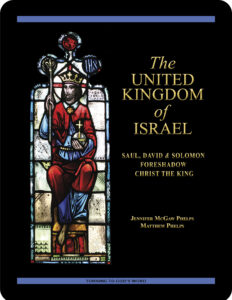 The United Kingdom of Israel:
The United Kingdom of Israel:
Saul, David & Solomon
Foreshadow Christ the King
Lesson 28 The United Kingdom Dies with Solomon
the First Book of the Kings 11:9—12:24
Revised Standard Version Catholic Edition (RSVCE)*
New American Bible Revised Edition (NABRE)*
Catechism of the Catholic Church
ex libris (in our library)
glossary for The United Kingdom of Israel
cross references in The United Kingdom of Israel
This material coordinates with Lesson 28 on pages 169–175 in The United Kingdom of Israel: Saul, David & Solomon Foreshadow Christ the King.
“When your days are fulfilled and you lie down with your fathers, I will raise up your offspring after you, who shall come forth from your body, and I will establish his kingdom. He shall build a house for my name, and I will establish the throne of his kingdom for ever.”
—the Second Book of Samuel 7:12–13
welcome to our in-depth study of Saul, David & Solomon
We invite interested groups and individuals to check out the sample first lesson from this 28- lesson
lesson  Turning to God’s Word Catholic Bible study. These online study pages link to our free lesson videos, as well as to a glossary and cross references in the biblical text. Other study aids include maps, additional commentary, and prayers based on the primary Scripture in each lesson. The United Kingdom of Israel: Saul, David & Solomon Foreshadow Christ the King has been granted an imprimatur and may be purchased from our website shop. If you have a Bible-study question or comment, click on the “ask us your question” or “what do you think” button on any study page.
Turning to God’s Word Catholic Bible study. These online study pages link to our free lesson videos, as well as to a glossary and cross references in the biblical text. Other study aids include maps, additional commentary, and prayers based on the primary Scripture in each lesson. The United Kingdom of Israel: Saul, David & Solomon Foreshadow Christ the King has been granted an imprimatur and may be purchased from our website shop. If you have a Bible-study question or comment, click on the “ask us your question” or “what do you think” button on any study page.
open with prayer
It’s always wise to begin any Bible study with prayer, whether reading the Scriptures alone or meeting with others in a discussion study group. You can pray using your own words or use one of the opening prayers on our website. We especially like the following:
Lord Jesus, you promised to send your Holy Spirit
to teach us all things.
As we read and study your word today,
allow it to touch our hearts and change our lives. Amen.
let’s review—the First Book of the Kings 9:1—11:8
In Lesson 27 God Appears Again to Solomon, instead of sending a prophet, the LORD shows himself to Solomon a second time. God’s message is that building a house for the LORD in Jerusalem doesn’t cancel the obligation to follow the commandments. If Solomon fails to toe the line, the LORD will have no problem destroying the Temple. King Hiram of Tyre, who has been supplying lumber and gold to Solomon for 20 years, is unimpressed with the 20 cities in Galilee that Solomon gives him. Solomon conscripts foreign laborers for all of his building projects, while the descendants of Jacob are given managerial positions. The Queen of Sheba, hearing of Solomon’s fame, visits Jerusalem to see for herself. What she finds takes her breath away, and Solomon enters into an alliance with Sheba. In addition to maintaining a large standing army, Solomon also amasses a huge amount of gold—666 talents a year. And he has 1,000 wives and concubines. Many of Solomon’s wives are from foreign nations, and they turn his heart away from the LORD and toward the worship of foreign gods.
map notes—going to Egypt
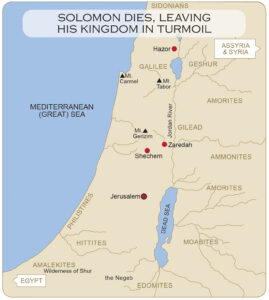 The pro-Solomon propaganda that has characterized the accounts of the united kingdom after the death of David disappears in the eleventh chapter in the First Book of the Kings. Enemies of Solomon show up, including Rezon in Damascus and Hadad, a member of the Edomite royal household who’s been living in Egypt since childhood. There are a number of parallels between Hadad’s story and the New Testament account of Joseph and Mary fleeing to Egypt to protect the infant Jesus from Herod, an Edomite installed by Rome as a puppet king of the Jews. The account of the threat to the young Hadad’s life from Joab, a Judahite, sets precedent for Herod later ordering the slaughter of all the male children in the area of Bethlehem.
The pro-Solomon propaganda that has characterized the accounts of the united kingdom after the death of David disappears in the eleventh chapter in the First Book of the Kings. Enemies of Solomon show up, including Rezon in Damascus and Hadad, a member of the Edomite royal household who’s been living in Egypt since childhood. There are a number of parallels between Hadad’s story and the New Testament account of Joseph and Mary fleeing to Egypt to protect the infant Jesus from Herod, an Edomite installed by Rome as a puppet king of the Jews. The account of the threat to the young Hadad’s life from Joab, a Judahite, sets precedent for Herod later ordering the slaughter of all the male children in the area of Bethlehem.
Throughout the Old Testament, Egypt’s Pharaohs shelter a variety of refugees. When Solomon learns of the prophecy that Jeroboam will take over most of the kingdom upon Solomon’s death, Jeroboam also is forced to flee to Egypt. It’s significant that under David’s rule, which relied on a strong military, the primary enemies of the united kingdom came from among the ranks of the descendants of Jacob. Most came from David’s own household. Under Solomon’s rule, however, foreign nations seem far less intimidated—probably because the kingdom under Solomon was far more reliant on regional trade than on military power. Click on the map (above right) to enlarge it. The original map is on page 172 in The United Kingdom of Israel: Saul, David & Solomon Foreshadow Christ the King.
 God remains true to his promise to David (22:21)
God remains true to his promise to David (22:21)
In the video overview for Lesson 28, “The United Kingdom Dies with Solomon,”  Turning to God’s Word author Matthew Phelps points out that the people so far who have been called to the kingship have a fairly bad track record when it comes to following the LORD’s commandments. Although David stands throughout salvation history as a type of Jesus, Saul and Solomon don’t fare so well. Of the 120 years during which the descendants of Jacob are united under one king,
Turning to God’s Word author Matthew Phelps points out that the people so far who have been called to the kingship have a fairly bad track record when it comes to following the LORD’s commandments. Although David stands throughout salvation history as a type of Jesus, Saul and Solomon don’t fare so well. Of the 120 years during which the descendants of Jacob are united under one king,  there’s a corruption rate of 67 percent. When Jeroboam is told that he’s to be given rule over 10 of the tribes, he’s also told something that could be construed as a warning—the LORD isn’t permanently turning away from the line of David.
there’s a corruption rate of 67 percent. When Jeroboam is told that he’s to be given rule over 10 of the tribes, he’s also told something that could be construed as a warning—the LORD isn’t permanently turning away from the line of David.
The Scripture ranges for the videos that accompany this Catholic Bible study from Turning to God’s Word match the Scripture ranges for the sets of questions in The United Kingdom of Israel: Saul, David & Solomon Foreshadow Christ the King. You can follow along as author Matthew Phelps discusses Lesson 28, “The United Kingdom Dies with Solomon,” on pages 169–175 in the study book.
an interesting detail about Solomon
Although the prophet Samuel advised Saul and David—and David also was counseled by the prophet Nathan—it seems that the LORD speaks to Solomon directly instead of through an intermediary. What can you suggest that might explain why?
 pray with the Psalms—his justice stands firm forever
pray with the Psalms—his justice stands firm forever
Taken together, Psalm 111 and Psalm 112 emphasize the eternal nature of the LORD’s covenant with David. Although Solomon seemed to think building the temple in Jerusalem would be enough to ensure that God would protect the earthly kingdom established for the descendants of Jacob, in the eleventh and twelfth chapters in the First Book of the Kings, the kingdom is torn apart when Solomon dies. Prayed at Sunday Second Vespers (Week I), Psalms 111 and  Psalm 112 are included as part of Lesson 3 You Are a Priest Forever in the Turning to God’s Word Catholic Bible study Sing a New Psalm: Communicating with God Through the Prayers of the Church—Volume I: Lauds & Vespers.
Psalm 112 are included as part of Lesson 3 You Are a Priest Forever in the Turning to God’s Word Catholic Bible study Sing a New Psalm: Communicating with God Through the Prayers of the Church—Volume I: Lauds & Vespers.
a repeating image
It’s worth noting that in the First Book of the Kings 11:31, when Ahijah informs Jeroboam that the united kingdom is going to be torn apart when Solomon dies, the prophet is using an image previously employed by another prophet. In the First Book of Samuel 15:28, Samuel used the same image to break the news to Saul that the LORD had torn the kingdom from him.
lineage of the kings
Because of his connection to Jesus, David’s lineage in the tribe of Judah is well known. David follows Saul, a Benjaminite. Jeroboam, who’s offered an opportunity at a covenant similar to that the LORD made with David, is from the half-tribe of Ephraim. That Jesus is born into the line of Judah is something of a surprise, given that Judah was born to Leah instead of to Jacob’s favorite wife Rachel. This points to Leah as the more legitimate first wife. Leah’s first three sons—Reuben, Simeon, and Levi—have disqualified themselves to pass on the patriarchal blessing, which then falls to Leah’s fourth son, Judah. Saul’s ancestor Benjamin, Jacob’s youngest son, was born to Rachel. Jeroboam, a descendant of Ephraim, is an interesting choice to rule. His ancestor Ephraim was a grandson of Jacob, born to Joseph and Joseph’s Egyptian wife. Jacob later adopted Ephraim and his brother Manasseh as his own  sons, and their descendants received an inheritance of land in Canaan. The Turning to God’s Word Catholic Bible study In the Beginning: The Book of Genesis provides information about Jacob’s family.
sons, and their descendants received an inheritance of land in Canaan. The Turning to God’s Word Catholic Bible study In the Beginning: The Book of Genesis provides information about Jacob’s family.
about that conscripted labor
The problems with conscripted labor that plague Solomon’s son Rehoboam present a discrepancy. In the First Book of the Kings 9:20, forced labor seemed to be limited to foreigners, with managerial jobs being filled by the descendants of Jacob. The twelfth chapter in the First Book of the Kings, however, indicates that at least members of the house of Joseph—descendants of Ephraim and Manasseh—also were conscripted to work on Solomon’s many construction projects.
WHAT DO YOU THINK about Rehoboam’s decision-making process?
Before he died, David talked with Solomon, instructing him about how to handle the responsibility that comes with the kingship. Perhaps David also should have suggested that it would be a good idea for Solomon in turn to provide his own son Rehoboam with some instruction about how to rule.
 ? What might account for why Solomon apparently didn’t counsel Rehoboam about issues that might arise once he ascended to the throne?
? What might account for why Solomon apparently didn’t counsel Rehoboam about issues that might arise once he ascended to the throne?
? What immediately emerges as a threat to Rehoboam’s continued reign?
? To what two groups does Rehoboam turn for advice about how to handle the situation?
? The First Book of the Kings 12:6 and 12:9 display a fascinating switch between personal and imperial language when Rehoboam is talking with his father’s advisers and his own more youthful peers. What exactly is the difference in the pronouns that Rehoboam uses when addressing each group?
? Consider what this language discrepancy suggests about how Rehoboam feels about his father’s advisers and about his own peers.
wisdom in short supply
The LORD granted to Solomon, Rehoboam’s father, the gift of great wisdom. Despite this, Solomon still managed to displease the LORD by worshiping false deities. David, Rehoboam’s grandfather, had a heart like God’s own. Despite this, David still managed to commit serious sins that displeased the LORD. The primary difference between Solomon and David is that David never turned away from worshiping the LORD. The twelfth chapter in the First Book of the Kings clearly indicates that Rehoboam didn’t inherit much of his father’s wisdom. No mention is made of Rehoboam’s relationship with the LORD, but the First Book of the Kings 12:24 records that Rehoboam does heed God’s warning not to  fight against his kin. Thus Says the LORD: God Speaks Through His Servants the Prophets—Volume I: A Kingdom Divided, the first part of our two-volume Catholic Bible study on the prophets, looks at what happens to God’s people after the death of Solomon.
fight against his kin. Thus Says the LORD: God Speaks Through His Servants the Prophets—Volume I: A Kingdom Divided, the first part of our two-volume Catholic Bible study on the prophets, looks at what happens to God’s people after the death of Solomon.
 kingdom of heaven—you could look it up in our archives
kingdom of heaven—you could look it up in our archives
The future of the kingdom is a primary concern of the authors of the First Book of the Kings. To learn the difference between earthly kingdoms and the “kingdom of heaven,” read Lost in Translation, an online column in which Turning to God’s Word author Matthew Phelps helps readers connect with ideas expressed in the original languages of the Scriptures. New Lost in Translation entries are posted on Mondays, and past entries are archived on our website. Contact us if you’d like to receive Lost in Translation by email every week.
WHAT DO YOU THINK about this Catholic Bible study?
Send us an email to share your experience studying The United Kingdom of Israel: Saul, David & Solomon Foreshadow Christ the King. We’d love to hear from you.
 ? Which passage from the First or Second Book of Samuel or the First Book of the Kings did you find to be the most relevant in your life, and why?
? Which passage from the First or Second Book of Samuel or the First Book of the Kings did you find to be the most relevant in your life, and why?
? How have your ideas about the Catholic faith changed as a result of studying The United Kingdom of Israel: Saul, David & Solomon Foreshadow Christ the King?
? What’s one unexpected way that this Bible study has touched your life?
? What’s something you’ve learned from studying the The United Kingdom of Israel: Saul, David & Solomon Foreshadow Christ the King that you’d like to share with others?
? To whom would you like to recommend The United Kingdom of Israel: Saul, David & Solomon Foreshadow Christ the King?
? What book of the Bible would you like to study next, and why?
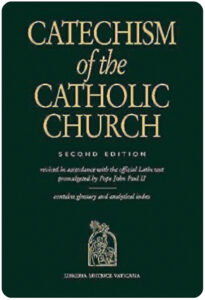 the best Catholic commentary about Scripture
the best Catholic commentary about Scripture
To find out more about how Church teaching is supported by Scripture passages in The United Kingdom of Israel: Saul, David & Solomon Foreshadow Christ the King, check out the Index of Citations in the Catechism of the Catholic Church. Links (Revised Standard Version Catholic Edition [RSVCE*]) to the primary Scripture passages in the lesson and relevant paragraphs in the Catechism are provided here. Not every passage in the biblical text for this Catholic study is referenced in a Catechism paragraph, however, including the passage in this lesson from the First Book of the Kings 11:9—12:24.
ways our glossary might prove helpful
In addition to providing extra information about geographical locations, our glossary also points out  persons and places mentioned in the biblical text under multiple names or spellings. If you can remember a name but aren’t sure in which lesson it shows up, you can find it in the glossary, which lists every proper noun that appears in the primary biblical text for The United Kingdom of Israel: Saul, David & Solomon Foreshadow Christ the King.
persons and places mentioned in the biblical text under multiple names or spellings. If you can remember a name but aren’t sure in which lesson it shows up, you can find it in the glossary, which lists every proper noun that appears in the primary biblical text for The United Kingdom of Israel: Saul, David & Solomon Foreshadow Christ the King.
to learn more, read more Scripture
If you’re having difficulty with a particular passage of Scripture, it can be helpful to read the relevant  cross references—but looking these up can take time. To make that easier, we’ve compiled the cross references from the Revised Standard Version Second Catholic Edition (RSV2CE)—the translation that we reprint in our study books. That list can be found at the top of every online study page, and it includes links to cross references in the primary biblical text for The United Kingdom of Israel: Saul, David & Solomon Foreshadow Christ the King.
cross references—but looking these up can take time. To make that easier, we’ve compiled the cross references from the Revised Standard Version Second Catholic Edition (RSV2CE)—the translation that we reprint in our study books. That list can be found at the top of every online study page, and it includes links to cross references in the primary biblical text for The United Kingdom of Israel: Saul, David & Solomon Foreshadow Christ the King.
don’t forget about our indexes & extra online material

 If you’re trying to locate information about a specific Scripture passage, you can look it up in the index at the back of the study book or sample lesson. If you want to find a particular commentary, you can look up its title in the topics index. To learn more about another book of the Bible for which there’s a Turning to God’s Word study, visit the online study directories to read the commentaries and watch any accompanying videos. Finally, if you have a question or would like to make a comment about any of our studies, you can use one of the “ask us your question” or “what do you think” buttons to email our authors.
If you’re trying to locate information about a specific Scripture passage, you can look it up in the index at the back of the study book or sample lesson. If you want to find a particular commentary, you can look up its title in the topics index. To learn more about another book of the Bible for which there’s a Turning to God’s Word study, visit the online study directories to read the commentaries and watch any accompanying videos. Finally, if you have a question or would like to make a comment about any of our studies, you can use one of the “ask us your question” or “what do you think” buttons to email our authors.
ex libris—Church documents & books about religious topics
Link to magisterial documents referred to in our Bible studies at ex libris—magisterial documents.  This listing includes significant recent encyclicals as well as a number of historical Church documents. Recommended books related to Scripture study can be found at ex libris—main bookshelf.
This listing includes significant recent encyclicals as well as a number of historical Church documents. Recommended books related to Scripture study can be found at ex libris—main bookshelf.
wondering how to pronounce some of these words?
The following link is to a reading from the New International Version (NIV) Bible. To listen, click on the audio icon above the printed text. Although not taken from the translations used in our study materials, the NIV reading provides an audio guide to pronunciation of words in this lesson’s primary biblical text. A close online version of the translation of the Bible used in Catholic liturgy in the United States as well as an audio guide for daily Mass readings for the current month can be found on the website of the United States Conference of Catholic Bishops (USCCB).
the First Book of the Kings 11:9—12:24 (NIV)
 close with Bible-based prayer related to this lesson
close with Bible-based prayer related to this lesson
Many of our Catholic study groups like to conclude their discussions with a prayer based on the scriptural focus of their lesson, and some participants include Scripture-specific prayer in their individual study. If you’re uncomfortable composing your own Bible-based prayers you can follow our four easy steps. If you prefer, you can use the following prayer based on the biblical text in this lesson in the study book The United Kingdom of Israel: Saul, David & Solomon Foreshadow Christ the King.
O God, you can be counted on to honor your covenant.
Help us aspire to be as faithful to you as you are to us.
Send us wise men and women to advise us
when we’re facing difficult decisions,
and give us the humility to accept their good counsel.
We ask this in the name of Jesus Christ,
whose faithfulness in doing your will
has opened for us the possibility of eternal life. Amen.
Lesson 27 God Appears Again to Solomon—the First Book of the Kings 9:1—11:8
you also may like our two-part study of the prophets
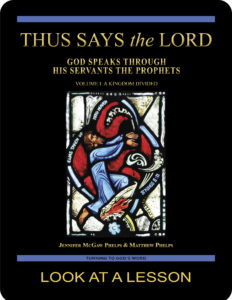
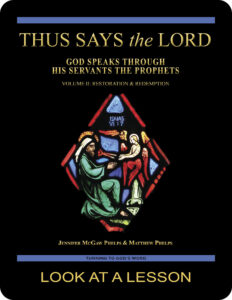 Thus Says the LORD: God Speaks Through His Servants the Prophets—Volume I: A Kingdom Divided examines the prophets in their historical context using the First and Second Books of the Kings and other Old Testament passages written before the Babylonian Exile in 586 B.C. Volume II: Restoration & Redemption looks at the post-exilic prophets. This 51-lesson Catholic Bible study builds on The United Kingdom of Israel: Saul, David & Solomon Foreshadow Christ the King. Click on the books’ covers to view a sample lesson from each volume.
Thus Says the LORD: God Speaks Through His Servants the Prophets—Volume I: A Kingdom Divided examines the prophets in their historical context using the First and Second Books of the Kings and other Old Testament passages written before the Babylonian Exile in 586 B.C. Volume II: Restoration & Redemption looks at the post-exilic prophets. This 51-lesson Catholic Bible study builds on The United Kingdom of Israel: Saul, David & Solomon Foreshadow Christ the King. Click on the books’ covers to view a sample lesson from each volume.
start a Turning to God’s Word Bible study
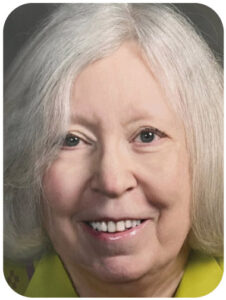 Thank you for your interest in The United Kingdom of Israel: Saul, David & Solomon Foreshadow Christ the King.
Thank you for your interest in The United Kingdom of Israel: Saul, David & Solomon Foreshadow Christ the King.  Information about beginning a Turning to God’s Word Bible study can be found at start a Bible study. Tami, Matthew, and I are available to answer questions. Contact us if you’d like to start one of our studies or have your schedule listed with other TtGW study groups on our website. —Jennifer
Information about beginning a Turning to God’s Word Bible study can be found at start a Bible study. Tami, Matthew, and I are available to answer questions. Contact us if you’d like to start one of our studies or have your schedule listed with other TtGW study groups on our website. —Jennifer
*There are seven deuterocanonical books in the Old Testament—the Books of Tobit, Judith, Wisdom, Sirach, Baruch, and First and Second Maccabees, as well as some passages in the Books of Esther and Daniel. Protestants usually refer to these works as “apocryphal,” a word that means “outside the (Protestant) canon” because they’re excluded from most Protestant Bibles. The word “deuterocanonical” means “second canon”; Catholics use that word to refer to any section of the Catholic Old Testament for which there are no extant, or existing, Hebrew manuscripts. All of the deuterocanonical books appear in the Septuagint, the earliest remaining versions of which date to the 1st century B.C. This Greek translation of the Old Testament was in common use by Jews at the time of Jesus—but the same books aren’t found in existing Hebrew manuscripts, which aren’t as old as the oldest version of the Septuagint. Learn more by reading How Do Catholic & Protestant Bibles Differ?
Turning to God’s Word printed Bible studies use the 2006 Revised Standard Version Second Catholic Edition (RSV2CE) translation for all Scripture references except those to the Psalms, which are taken from The Abbey Psalms and Canticles, prepared by the Benedictine monks of Conception Abbey and published in 2020 by the United States Conference of Catholic Bishops (USCCB). All Scripture links for the online study pages for The United Kingdom of Israel: Saul, David & Solomon Foreshadow Christ the King are to the 1966 Revised Standard Version Catholic Edition (RSVCE) translation. The New International Version (NIV) audio recordings follow the same chapter and verse numbering as the RSV Catholic translations, but the NIV translation doesn’t include the deuterocanonical books and passages.
The 1966 RSVCE uses archaic pronouns and verb forms such as “thee,” “thou,” “didst” in the Psalms and in direct quotations attributed to God. The 2006 RSV2CE replaces those with more accessible English. The few significant translation changes in the RSV2CE include rendering almah as “virgin” in the Book of Isaiah 7:14 and restoring the term “begotten” in the Gospel According to John 3:16.
Numbering varies for some passages in this Bible study. Turning to God’s Word studies (print and digital) follow the numbering in the Revised Standard Version Catholic translations (RSV2CE and RSVCE). Discrepancies in the New American Bible Revised Edition (NABRE) are noted in the Index of Scripture Citations in the study book and the online sample.
 You can learn more about the Psalms by viewing a sample lesson from the Turning to God’s Word Catholic Bible study Sing a New Psalm: Communicating with God Through the Prayers of the Church—Volume I: Lauds & Vespers. The second part of that study, Sing a New Psalm: Communicating with God Through the Prayers of the Church—Volume II: Vigils, Day Prayer & Compline, is scheduled for publication in 2025. Some verse numbers may vary in different translations of the Psalms.
You can learn more about the Psalms by viewing a sample lesson from the Turning to God’s Word Catholic Bible study Sing a New Psalm: Communicating with God Through the Prayers of the Church—Volume I: Lauds & Vespers. The second part of that study, Sing a New Psalm: Communicating with God Through the Prayers of the Church—Volume II: Vigils, Day Prayer & Compline, is scheduled for publication in 2025. Some verse numbers may vary in different translations of the Psalms.
